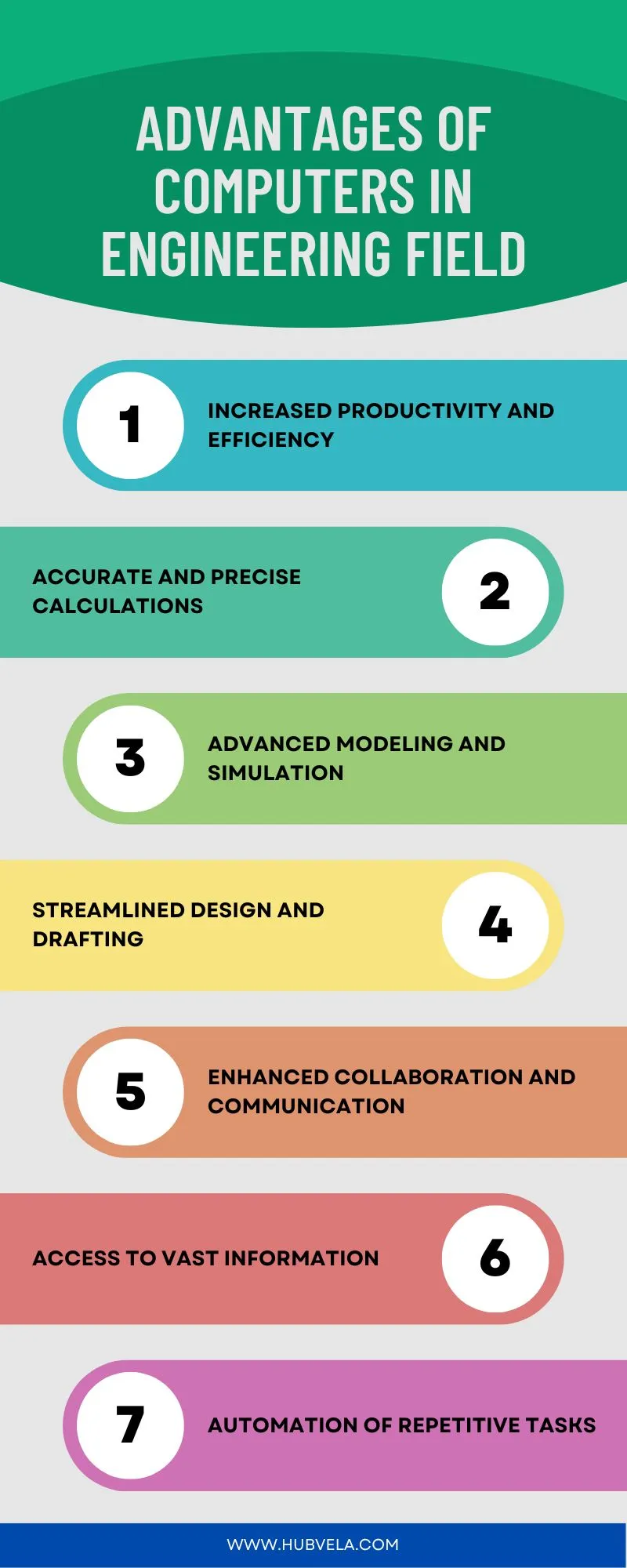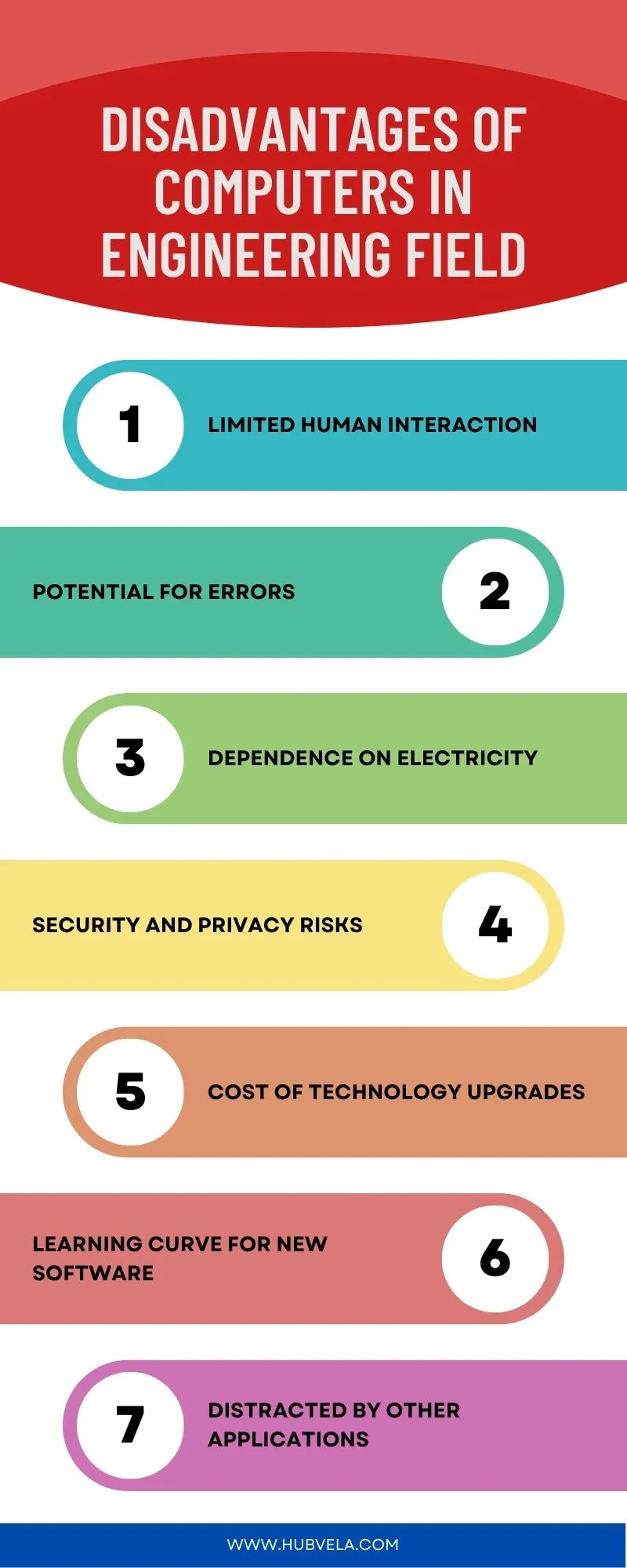Did you know that computers have revolutionized the engineering field? In today’s fast-paced world, where efficiency and accuracy are paramount, computers have become an essential tool for engineers.
They offer numerous advantages, such as increased productivity, precise calculations, advanced modeling, and streamlined design.
However, like any technological advancement, there are also disadvantages. Upgrading technology can be costly, and learning new software may require some time and effort.
Additionally, the presence of other applications on computers can sometimes be distracting.
In this article, we will explore both the advantages and disadvantages of computers in engineering field, helping you understand the impact they have on this industry.

--Advertisement--
Advantages of Computers in Engineering Field
Computers have become an integral part of the engineering field, providing numerous advantages to engineers. The use of computers in engineering has revolutionized the way engineers design, analyze, and manufacture products.
From mechanical engineering to electrical engineering, computers are used in various fields to perform tasks such as designing graphics, automated control of manufacturing, and power distribution. We will discuss the advantages of computers in the engineering field.

1. Increased Productivity and Efficiency
By utilizing computer technology, you can significantly improve your productivity and efficiency in the engineering field.
Computers enable increased collaboration among team members, allowing for faster and more effective communication.
With access to vast amounts of data and advanced software tools, you can make more informed decisions and solve problems more efficiently.
Computers also help decrease errors by automating repetitive tasks and optimizing processes.
2. Accurate and Precise Calculations
Improve your engineering calculations with the accuracy and precision offered by computer technology.
Computers are capable of performing high-speed calculations, thanks to their computational power and efficient algorithms. This allows for improved accuracy in complex calculations and data analysis.
With computers, engineers can rely on precise results, reducing the chances of human error. By leveraging the computational capabilities of computers, engineers can enhance their work and make more informed decisions based on accurate calculations.
3. Advanced Modeling and Simulation
Enhance your engineering work by harnessing the power of advanced modeling and simulation in the field. With advanced modeling techniques and simulation software, you can create virtual testing environments that accurately represent real-world conditions.
This allows for efficient and cost-effective testing of design concepts before physical prototypes are built. The data analysis capabilities of simulation software enable you to analyze and interpret large amounts of data quickly and accurately.
Furthermore, optimization algorithms can be utilized to fine-tune designs and improve performance, leading to better engineering solutions.
4. Streamlined Design and Drafting
With advanced modeling and simulation, computers in the engineering field provide numerous advantages in streamlined design and drafting.
Digital prototyping allows engineers to create virtual models of their designs, saving time and resources. Efficient design iterations enable engineers to quickly make changes and improvements to their designs. Increased precision ensures that designs are accurate and meet the required specifications.
Time-saving drafting tools automate repetitive tasks, increasing productivity. Improved project management tools help in organizing and tracking the progress of design and drafting projects.
5. Enhanced Collaboration and Communication
Collaboration and communication in the engineering field are significantly enhanced through the use of computers. With the help of collaborative tools, engineers can work together on projects regardless of their physical location. Virtual meetings allow for real-time communication, enabling teams to discuss and resolve issues efficiently.
Computers also enable remote collaboration, where team members can contribute to projects from different locations. Additionally, project management software streamlines communication by providing a centralized platform for sharing information and tracking progress.
6. Access to Vast Information
You can tap into a wealth of knowledge and resources with computers in the engineering field. The accessibility of vast information through the internet allows engineers to access data, research capabilities, and innovative solutions to complex problems.
Computers also offer efficient data storage, enabling engineers to store and retrieve large amounts of information quickly. This access to vast information empowers engineers to stay up-to-date with the latest advancements and make informed decisions, ultimately enhancing problem-solving abilities and fostering innovation.
7. Automation of Repetitive Tasks
By automating repetitive tasks, computers in the engineering field increase efficiency and productivity, enabling engineers to focus on more complex and creative problem-solving.
The automation benefits are significant, as it allows engineers to complete tasks in a fraction of the time it would take manually. This increased efficiency leads to improved accuracy and reduced human error.
However, there are concerns about the impact on the job market, as some repetitive tasks may become obsolete with increased automation.
Disadvantages of Computers in Engineering Field
The use of computers in the engineering field has been a significant development in recent years. However, despite the numerous advantages, there are also some disadvantages to relying heavily on computers and computer-aided tools.
We will discuss the disadvantages of computers in the engineering field, including the potential for errors, security risks, and the challenge of keeping up with technological advancements.

1. Limited Human Interaction
One disadvantage of computers in the engineering field is the limited human interaction they offer. With increased automation, there’s a reduced need for human involvement, which can lead to potential drawbacks.
Engineers may experience social isolation and fewer communication opportunities as they rely more on computer systems. This limited interaction can hinder collaboration and creativity, as face-to-face communication often fosters a deeper understanding and more effective problem-solving.
2. Potential for Errors
Computers in the engineering field have a potential for errors that can impact the accuracy and reliability of engineering processes.
While computers are designed to be precise, they’re still susceptible to potential errors. These errors can occur due to human error or system malfunctions.
However, there are various error prevention techniques that can be implemented to minimize the impact of errors. By continuously improving these techniques, engineers can strive for greater accuracy and reliability in their work.
3. Dependence on Electricity
To minimize the potential for errors, engineers must also consider the disadvantages of computers in the engineering field, such as their dependence on electricity. Power outages can disrupt work and lead to delays in projects. Engineers need to have backup solutions in place to ensure uninterrupted workflow.
Additionally, the reliance on electricity raises concerns about sustainability and environmental impact. Incorporating renewable energy sources and improving energy efficiency in computer systems can help mitigate these drawbacks.
4. Security and Privacy Risks
When considering the disadvantages of computers in the engineering field, it’s important to address the security and privacy risks that engineers may face.
With the increasing reliance on computers and the internet, data breaches, hacking attacks, and cyber threats have become a major concern. Engineers may also have privacy concerns when sensitive information is stored on computer systems.
Therefore, it’s crucial for engineering companies to implement robust security measures to protect against these risks.
5. Cost of Technology Upgrades
Upgrading technology in the engineering field can be costly for you as an engineer. The cost implications and financial impact of technology upgrades should be carefully considered.
Budget considerations play a crucial role in determining whether or not to invest in new technology. Engineers need to weigh the potential return on investment against the cost effectiveness of upgrading their current systems.
It’s important to make informed decisions that align with both your engineering needs and your budget constraints.
6. Learning Curve for New Software
When learning new software in the engineering field, you may face a steep learning curve. Some software programs may not have ease of use, making it challenging to navigate and understand.
Training programs can help mitigate this issue, providing resources and guidance to help engineers get up to speed.
Additionally, software compatibility can be a concern, as not all programs work seamlessly together. It’s important to have access to learning resources and stay updated with software updates to stay ahead in the field.
7. Distracted by Other Applications
You may often find yourself getting distracted by other applications while working in the engineering field, which can be a disadvantage of using computers. These distractions can have a negative impact on your focus and concentration, making it difficult to stay on task.
Additionally, managing your time effectively becomes a challenge when you’re constantly tempted by other applications. This can also lead to decreased human to human interaction, as you may prefer spending more time on your computer rather than engaging with colleagues.
Furthermore, excessive screen time can have negative effects on your creativity, limiting your ability to think outside the box.
Lastly, there’s a potential for addiction and excessive screen time, which can negatively impact your overall well-being.
Conclusion on Advantages and Disadvantages of Computers in Engineering Field
In conclusion, the use of computers in the engineering field has been advantageous in various ways, such as improving productivity, solving complex problems, and enabling automation.
However, there are also disadvantages associated with computer technology in engineering, including the need for constant learning, the potential for eye strain, and the possibility of reduced physical interactions.
As technology continues to evolve, it is essential for engineers to adapt and find ways to balance the benefits and challenges that come with using computers in their work.
By doing so, they can continue to leverage the power of computers to drive innovation and improve the overall efficiency of their engineering projects.


